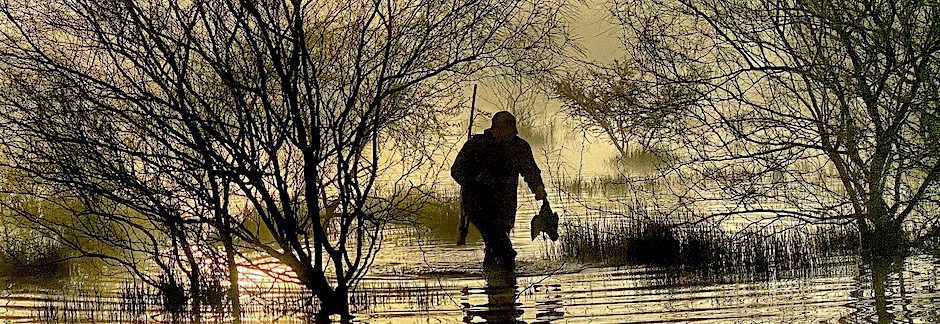MOJO’S Duck Season Somewhere Podcast
EP 538. Five Generations Island Living

Rob Shaw’s ancestors moved to Prince Edward Island 5 generations ago. They’ve since made their livings and fed their families by seasonally availing themselves of the island’s inherently abundant natural resources–namely tourists, ducks and seafood. A memorable pair black duck used as live decoys are recalled among many other things. Island life still revolves these resources, black ducks are a real big deal, and in hearing Rob recall lifetime events here you gain the sense of a real tightly-knit community that’s uncommonly found elsewhere.
EP 571. Straight Shooting for Hunters

Outdoor legends Will Primos and Anthony Matarese Jr. break down the habits, mindset, and gear choices that separate good shooters from great ones. From mastering fundamentals to understanding ethical shot selection, their practical, no-nonsense advice that will help you become a more confident and capable shotgunner in the field. Biggest misconcenptions in shotgunning, most common mistakes, world-class shooting habits, practical tips, dominant eye, proper mount, lead distances, and more–we cover it all! Whether new to hunting or refining your craft, everyone will appreciate this lively discussion. Boom!
EP 570. Sparkleberry Swamp Legend (Part 1)

Seventy-nine-year-old Mr. Toy McCord takes us deep into the heart of Sparkleberry Swamp—where he was raised, mentored, and shaped by wild water and duck hunting tradition. He shares vivid memories from his earliest days–like the time a 5-year-old Toy, his brothers and Dad were stranded in the swamp for days–the people who taught him the swamp’s secrets, and how his duck hunting passion became a way of life. With unforgettable stories, close calls, and reflections on a changing landscape, Mr. Toy gives voice to a magical place and time that few truly know.
EP 569. Flying V

Been a real long time since catching up with buddies Brady Davis and Matt McCormick (Ep 76. Of Hippies and Cowboys, Bozeman, MT), but they’ve been busy since then–that’s for danged sure! Like an Alberta clipper sweeping across open range, we race through a lot of fun topics—swapping 10-gauge for 28-gauge shotguns, running Chesapeake Bay retrievers in Montana, forming their Flying V companies, developing habitat, managing hunting pressure, collaborating with MeatEater, and their thoughts on ensuring that brand partnerships stay authentic. Never a dull moment with these boys!
Related Links:
www.FlyingV.us
EP 568. Feathers, Friends and Fond Memories from Nayarit, Mexico

Having south-of-the-border fun entailed an action-packed couple weeks in Nayarit, Mexico, but as usual it was about way, way more than just trigger pulls. Our appetites for ducks, doves, local eats and delicious margaritas satiated, Ramsey meets with hunters that came from throughout the US and even from far away as Denmark to hear their recollections of feathers, friendships and fond memories. Whether interested in extending your own duck hunting season, simply curious about why folks travel here to hunt–or even learn a few new Spanish phrases–you’ll appreciate these candid conversations.
EP 567. Getting on the “X” with onX Hunt Maps–and Then Some

onX Maps’s Lake Pickle and I jump into the most powerful navigational app ever invented, exploring the many ways it’s revolutionizing our hunting adventures. We discuss what sets it apart from other mapping tools, its key features for hunters, and how its used to put you on the X and then some. Lake shares real-world applications and experiences; popular features he and others most oftentimes use; describes the ways to gain the most function from the powerful onX app; and teases upcoming features that will enhance your experience even further. Whether you’re a seasoned onX hunter or just getting started, you’ll gain the insights needed to make the very most of onX Maps and put the world–and the birds–right in the palm of your hand.
EP 566. Building Waterfowl Habitat on Maryland’s Eastern Shore

Though he’s built and managed wildlife habitat on Maryland’s Eastern Shore for the past couple decades, Spencer Waller quickly points out that he’s no wildlife biologist–but knows what ducks want, what ducks like to eat and how to make it happen. His heartbeat may be black mud marsh duck hunting, but he’s in the business of helping landowners put together hunting properties across the Bay from unimaginably unbridled urban sprawl.
Related Links:
EP 565. Eastern Shore Maryland Goose Hunter: From Student to Mentor

Goose hunting has been a pretty big deal on Maryland’s eastern Shore since forever, and John Taylor’s introductions began when first shaking hands with his high school sweetheart’s dad. Cutting his teeth back in the days of “junk yard rigs,” he remembers laying out a small fortune for a newfangled Eastern Shoreman goose call, later saying that “the Moratorium (the 6-year period that Canada goose hunting was closed) was the best thing that ever happened.” Because that’s when he earned his real PhD in Canada goose behavior. A storyteller from the get-go, Taylor colorfully recalls an Eastern Shore goose hunting lifetime from student to mentor. And then some.
Related Links:
EP 564. Looking Back

What began as buck-fever-of-epic-proportions first deer hunt with a neighboring mentor began a lifelong passion for hunting and fishing worldwide for Alabama native and storyteller Clint Ward. From an elk hunt that culminated in a marriage proposal to nearly dying atop a British Columbia mountain, Ward shares colorful stories about how hunting experiences shaped his life and taught him what’s most important in life.
Related Links:
EP 563. Dead Hens Don’t Lay Eggs and Other Topics

In case you haven’t noticed, North American duck populations–duck harvests–have declined from the highs of the late-90s. Dead hens don’t lay eggs, for sure, but is the fix that simple? What are the root causes for these declines in waterfowl populations? How bad is it, why might it get way worse before it gets better, and what can we duck hunters really do about it? Scott Stephens, DU’s Senior Director of Prairie and Boreal Forest Conservation, joins me to discuss.








